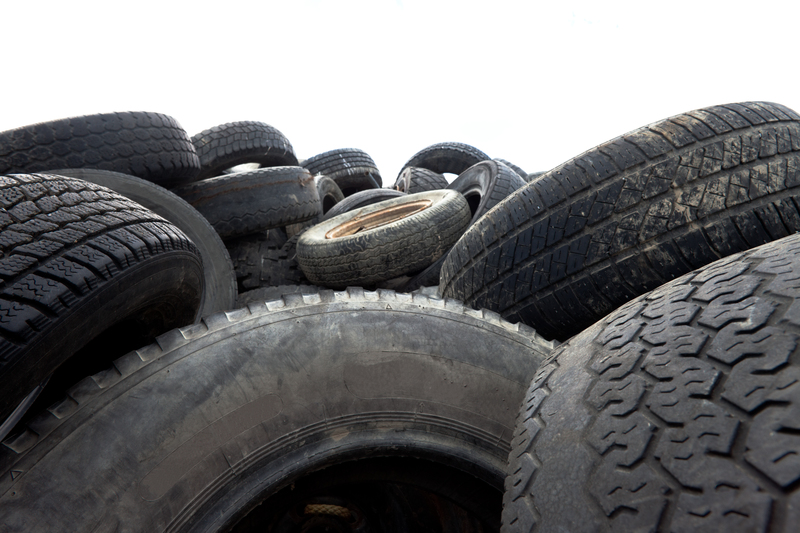Effective Strategies to Minimize Your Household Waste
Are you looking for actionable tips on how to reduce household waste? Minimizing waste at home is not just great for the planet; it can also save you money and create a cleaner, healthier living environment. In this comprehensive guide, we'll explore effective strategies to minimize your household waste, helping you develop sustainable habits that make a real difference. Whether you're just starting your eco-friendly journey or looking to deepen your zero-waste commitment, these methods will inspire you to act.

Understanding the Importance of Household Waste Reduction
Household waste consists of the everyday items we throw away--food scraps, packaging, plastic, paper, and more. In an age of convenience and overconsumption, the average household generates a significant amount of waste, much of which ends up in landfills and contributes to environmental problems like pollution and greenhouse gas emissions.
- Environmental Impact: Reducing waste decreases pollution and conserves natural resources.
- Financial Savings: Less waste means buying less, which translates to more money in your pocket.
- Health Benefits: A cleaner home environment means less clutter and lower exposure to toxic materials.
By adopting household waste minimization strategies, you're taking a concrete step toward a more sustainable lifestyle.
Start with Waste Audit
What Is a Waste Audit and Why Is It Important?
A waste audit is a simple but powerful tool for managing household waste. The process involves analyzing the trash your household generates in a week or two. By categorizing and weighing what you throw away, you gain insights into the main sources of your waste.
- Track all trash for one week.
- Sort waste into categories (food, plastics, paper, etc.).
- Identify which items are most prevalent.
Tip: Take notes during your audit. This will help you focus your waste reduction efforts on the highest-impact areas.
Adopt the 5 R's of Waste Minimization
The foundation of any successful household waste reduction plan lies in the 5 R's:
- Refuse--Say no to products or packaging you don't need.
- Reduce--Buy and use less.
- Reuse--Find new ways to use things instead of discarding them.
- Recycle--Sort and recycle all eligible materials.
- Rot--Compost food scraps and organic matter.
1. Refuse: The Power of Saying No
Practicing refusal means making conscious choices not to acquire unnecessary items. When you refuse single-use plastics, junk mail, freebies, and excessive packaging, you stop waste before it even enters your home.
- Say "no thanks" to plastic bags and straws.
- Unsubscribe from paper junk mail.
- Opt out of unnecessary promotional items.
2. Reduce: Buy and Use Less
Being mindful of your consumption automatically leads to less waste. Ask yourself: Do I really need this? Can I buy a smaller amount or less frequently?
Minimalism is an effective strategy here.
- Buy in bulk to reduce packaging waste.
- Choose products with longer lifespans.
- Avoid impulse purchases.
3. Reuse: Give Items a Second Life
Develop a habit of repurposing and reusing before discarding. Often, items destined for the trash can be reused in creative ways around the house.
- Use glass jars for storage instead of buying new containers.
- Repurpose old clothes as cleaning rags.
- Donate or swap items you no longer need.
4. Recycle: Do It Right
Modern recycling programs make it easy to divert materials from landfills, but contamination can render recycled goods useless. Learn your local recycling rules and sort waste properly.
- Rinse containers before recycling.
- Keep plastic bags and soft plastics out of standard bins.
- Recycle batteries, electronics, and hazardous materials at proper facilities.
5. Rot: Composting at Home
Composting is essential for minimizing food and yard waste. Kitchen scraps and garden trimmings can be turned into valuable fertilizer, closing the loop on organic matter.
- Start a backyard compost pile or use a countertop bin for food waste.
- Compost fruit and vegetable scraps, coffee grounds, and eggshells.
- Avoid composting meat, dairy, or oily foods unless using special composters.
Eliminate Single-Use Items
Single-use plastics and paper goods are among the top contributors to household waste. Swapping these for reusable alternatives can dramatically reduce your home's trash output.
- Switch to cloth napkins and dish towels.
- Opt for stainless steel or glass water bottles.
- Replace disposable razors with safety razors.
- Invest in reusable shopping bags and produce sacks.
Pro-Tip: Keep reusable items near your front door or in your car as a reminder.
Plan Shopping and Meals to Prevent Food Waste
Did you know that food waste makes up a significant portion of household trash? Preventing food waste is a key aspect of reducing home waste. With careful planning, you can ensure less food ends up in the garbage.
Smart Shopping
- Make a weekly meal plan and stick to your shopping list.
- Avoid buying perishable goods in bulk unless you'll use them promptly.
- Check your fridge and pantry before heading to the store to avoid duplicates.
Proper Storage
- Store produce in the correct spots to extend freshness.
- Use clear containers so food isn't forgotten in the back of the fridge.
- Freeze items you won't use before they spoil.
Creative Leftovers
- Designate one night a week as "leftovers night."
- Repurpose scraps for soups, casseroles, or smoothies.
- Compost unavoidable food waste.
Buy in Bulk and Choose Minimal Packaging
Shopping in bulk reduces individual packaging, a significant source of unnecessary waste. Many grocery stores now offer bulk bins for grains, nuts, spices, and more--just bring your own reusable containers.
- Buy frequently used items like rice, pasta, and oats in large quantities.
- Seek out stores that allow "fill your own" containers.
- Select products packaged in recyclable or compostable materials.
Choose Sustainable Products and Support Green Brands
When purchasing household goods, opt for items designed with the end of their lifecycle in mind. This approach, known as cradle-to-cradle design, ensures sustainability from production to disposal.
- Support brands committed to minimal packaging and ethical sourcing.
- Look for products labeled as biodegradable, compostable, or made with recycled content.
- Research the sustainability commitments of companies before making purchases.
Engage the Whole Household
Waste minimization works best as a team effort. Involve everyone in your home, young and old, in your household waste minimizing strategies.
- Assign recycling and composting roles to each family member.
- Set up easy-to-use sorting systems.
- Educate children with fun activities about sustainability and the environment.
Make It Fun!
Challenge your household to a "waste-free week" or hold competitions for who can come up with the most creative ways to reuse items. Celebrate successes together to keep motivation high.
Reduce Paper Waste at Home
Paper is one of the easiest items to cut down. With the rise of digital alternatives, reducing paper waste is more convenient than ever.
- Switch to digital bills, receipts, and statements.
- Use both sides of paper before recycling it.
- Opt for cloth towels over paper towels whenever possible.
- Compost uncoated paper products.
Repair and Upcycle Instead of Discarding
Before throwing items away, consider whether they can be repaired or upcycled. This not only saves money but also fosters creativity and resourcefulness.
- Learn basic mending, sewing, and repair skills.
- Fix broken electronics or appliances when possible.
- Transform jars, cans, or old clothes into new storage or craft items.
Set Up a Comprehensive Recycling System
A well-organized recycling system makes it easy for every member of your household to participate in waste reduction efforts.
- Place recycling bins in convenient locations: kitchen, office, bathrooms.
- Post clear signage about what can and cannot be recycled in your area.
- Schedule regular trips to recycling centers for materials not collected curbside (e.g., e-waste, textiles, batteries).
Advocate in Your Community
Community involvement amplifies the impact of your efforts. Join or start local initiatives focused on waste reduction--this could be a neighborhood composting program, a swap meet, or an educational campaign on recycling best practices.
- Share your knowledge and experiences with others.
- Encourage local businesses to offer more sustainable products and packaging.
- Participate in community clean-up days to inspire collective action.

Keep Adapting and Learning
Sustainable living is an ongoing process. As you continue to practice household waste minimization, look for new and innovative ways to improve. Stay informed by following environmental blogs, podcasts, and organizations dedicated to waste management and sustainability.
- Stay updated on changing recycling guidelines and waste management technology.
- Try new zero-waste products or practices as they become available.
- Reflect regularly on your progress and celebrate milestones.
Conclusion: Make Waste Reduction a Way of Life
By implementing these effective strategies to minimize your household waste, you'll not only reduce your environmental footprint, but also create a cleaner, more organized, and efficient home. Remember, reducing household waste doesn't have to be overwhelming--start with small steps and watch as your positive habits build momentum.
Embrace a zero-waste mindset: Every piece of trash you avoid is a victory for the planet. Together, through conscious choices and community engagement, we can move toward a more sustainable and earth-friendly future.
Ready to take action? Audit your waste, involve your household, and explore the many creative ways to minimize waste at home. For more expert tips and sustainable living guides, stay tuned to our blog!